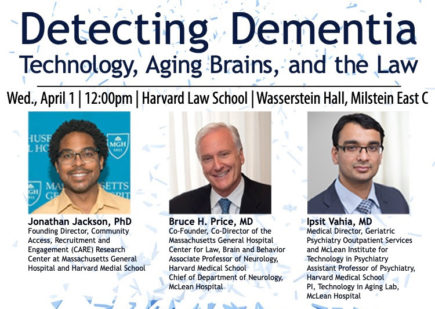April 1, 2020 12:00 PM at Harvard Law School

Description
Advances in neuroimaging, genetics, and mobile health apps are creating unprecedented opportunities to detect subtle brain changes that may predict the onset of Alzheimer’s disease and other types of dementia. But how much trust should we have in these new technologies, who will have access to them, and how should the law respond when litigants proffer novel evidence of their brain states? This panel will explore technological innovations in dementia detection, and their ethical, social, and legal implications.
Panelists
- Jonathan Jackson, PhD, is the founding director of the Community Access, Recruitment, and Engagement (CARE) Research Center at Massachusetts General Hospital and Harvard Medical School, which investigates the impact of diversity and inclusion on the quality of human subjects research and leverages deep community entrenchment to build trust and overcome barriers to clinical trial participation. His research focuses on midlife and late-life health disparities in clinical settings that affect Black populations. Dr. Jackson also works as a cognitive neuroscientist, investigating the early detection of Alzheimer’s disease (AD), particularly in the absence of overt memory problems. He serves on Massachusetts General Hospital’s Alzheimer’s Disease Research Center (ADRC) and MGH’s Cancer Center Equity Program, specializing in identifying and overcoming barriers to clinical research for people and communities of color. He has become a well-known MGH representative to communities of color and dozens of affiliated organizations, particularly regarding clinical research. Dr. Jackson serves on the leadership team of several organizations focused on community health, as well as local, statewide, and national advisory groups for research recruitment, Alzheimer’s disease, and community engagement
- Bruce H. Price, MD, is Co-Founder and Co-Director of the Massachusetts General Hospital Center for Law, Brain and Behavior. Dr. Price graduated from Harvard University cum laude, and attended the University of Cincinnati College of Medicine. In 1994, he was appointed Chief of the Department of Neurology at McLean Hospital. He is an Associate in Neurology at Massachusetts General Hospital and Associate Professor of Neurology at Harvard Medical School. In 1996, he co-founded the Neuropsychology Fellowship Training Program at McLean Hospital. In 1999, he founded the Behavioral Neurology/Neuropsychiatry Fellowship Training Program at McLean Hospital. He is the Co-Founder and Co-Director of the Neuropsychiatry Fellowship at Massachusetts General Hospital, and the Co-Founder and Associate Director of the Fronto-Temporal Dementia Fellowship at Massachusetts General Hospital. In 2006, the Bruce H. Price, M.D. Award for Clinical and Academic Excellence in Neuropsychiatry and Behavioral Neurology was established in his honor. He supervises approximately 20 psychiatry, neuropsychology, and neurology residents and fellows per year. An internationally recognized leader in the integration of neurology, psychiatry, neurosurgery, and neuropsychology, his research interests include the cognitive and behavioral consequences of neurologic and psychiatric diseases, brain dysfunction in violent and criminal behavior, frontal lobe functions including insight, judgment, empathy, self-awareness, social adaptation, and decision-making, memory disorders, and dementias, complex decision-making, fraud, and undue influence. His fascination with the intersections between medicine, law, and ethics is longstanding.
- Ipsit Vahia, MD, is a geriatric psychiatrist, clinician, and researcher. He is medical director of the Geriatric Psychiatry Outpatient Services at McLean Hospital and the McLean Institute for Technology in Psychiatry. His research focuses on the use of technology and informatics in the assessment and management of older adults and currently, he oversees a clinical and research program on aging, behavior, and technology. He has published extensively in major international journals and textbooks. Dr. Vahia serves on the American Psychiatric Association (APA) Council on Geriatric Psychiatry and the Geriatric Psychiatry Committee of the American Board of Psychiatry and Neurology. He has served on the board of directors of the American Association for Geriatric Psychiatry (AAGP) and on the editorial boards of five journals including his current role as social media editor of the American Journal of Geriatric Psychiatry. He is a recipient of several prestigious awards including the 2016 AAGP Barry Lebowitz Award and the 2014 APA Hartford Jeste Award.
Part of the Project on Law and Applied Neuroscience, a collaboration between the Center for Law, Brain & Behavior at Massachusetts General Hospital and the Petrie-Flom Center for Health Law Policy, Biotechnology, and Bioethics at Harvard Law School.



